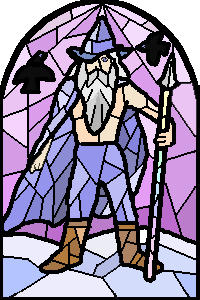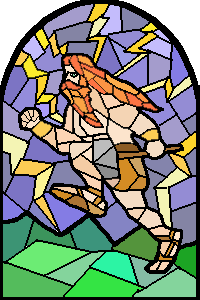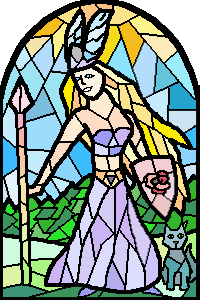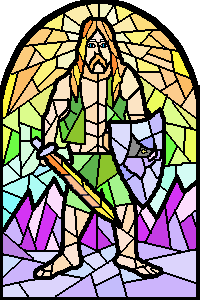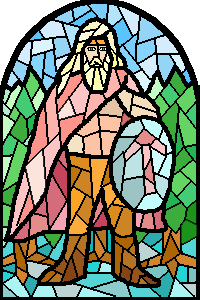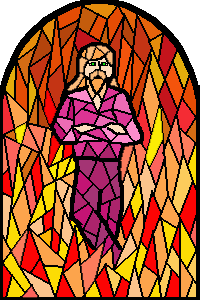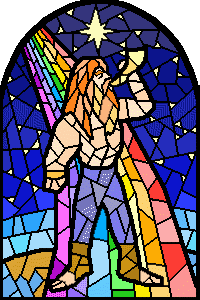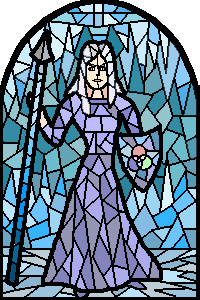Meet the Gods and Goddesses of the Norse Pantheon
- Details
- Written by AndEl
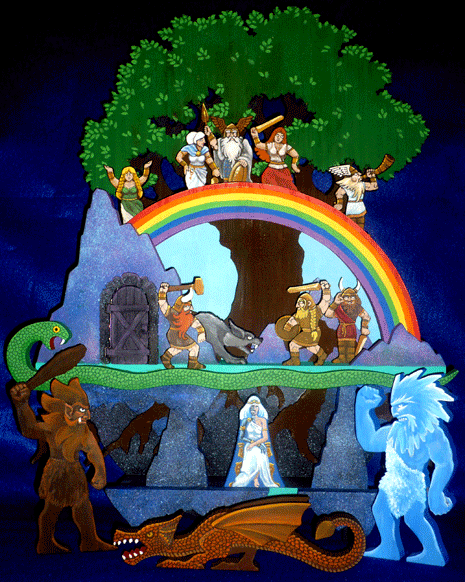
Odin (or, depending upon the dialect Woden or Wotan) was the Father of all the Gods and men. Odhinn is pictured either wearing a winged helm or a floppy hat, and a blue-grey cloak. He can travel to any realm within the 9 Nordic worlds. His two ravens, Huginn and Munin (Thought and Memory) fly over the world daily and return to tell him everything that has happened in Midgard.
He is a God of magick, wisdom, wit, and learning. He too is a psychopomp; a chooser of those slain in battle. In later times, he was associated with war and bloodshed from the Viking perspective, although in earlier times, no such association was present. If anything, the wars fought by Odhinn exist strictly upon the Mental plane of awareness; appropriate for that of such a mentally polarized God. He is both the shaper of Wyrd and the bender of Orlog; again, a task only possible through the power of Mental thought and impress. It is he who sacrifices an eye at the well of Mimir to gain inner wisdom, and later hangs himself upon the World Tree Yggdrasil to gain the knowledge and power of the Runes. All of his actions are related to knowledge, wisdom, and the dissemination of ideas and concepts to help Mankind. Because there is duality in all logic and wisdom, he is seen as being duplicitous; this is illusory and it is through his actions that the best outcomes are conceived and derived. Just as a point of curiosity: in no other pantheon is the head Deity also the God of Thought and Logic. It's interesting to note that the Norse/Teutonic peoples also set such a great importance upon brainwork and logic. The day Wednesday (Wodensdaeg) is named for him.
Thor, or Donnar, also known as the Thunderer, was considered to be a son of Odin by some, but among many tribes Thor actually supplanted Odin as the favorite god. He is considered to be the protector of all Midgard, and he wields the mighty hammer Mjollnir. Thor is strength personified. His battle chariot is drawn by two goats, and his hammer Mjollnir causes the lightning that flashes across the sky. Of all the deities, Thor is the most "barbarian" of the lot; rugged, powerful, and lives by his own rules, although he is faithful to the rest of the Aesir. The day Thursday (Thorsdaeg) is sacred to him.
Freya is considered to be the goddess of Love and Beauty, but is also a warrior goddess and one of great wisdom and magick. She and her twin brother Freyr are of a different "race" of gods known as the Vanir. Many of the tribes venerated her higher than the Aesir, calling her "the Frowe" or "The Lady." She is known as Queen of the Valkyries, choosers of those slain in battle to bear them to Valhalla (the Norse heaven). She, therefore, is a psychopomp like Odhinn and it is said that she gets the "first pick" of the battle slain. She wears the sacred necklace Brisingamen, which she paid for by spending the night with the dwarves who wrought it from the bowels of the earth. The cat is her sacred symbol. There seems to be some confusion between herself and Fricka, Odin's wife, as they share similar functions; but Fricka seems to be strictly of the Aesir, while Freya is of the Vanic race. The day Friday (Frejyasdaeg) was named for her (some claim it was for Fricka).
Freyr (Fro Ingwe) is Freya's twin brother. He is the horned God of fertility, and has some similarities to the Celtic Cernunnos or Herne, although he is NOT the same being. He is known as King of the Alfs (elves). Both the Swedish and the English are said to be descendents of his. The Boar is his sacred symbol, which is both associated with war and with fertility. His golden boar, "Gullenbursti", is supposed to represent the daybreak. He is also considered to be the God of Success, and is wedded to Gerda, the Jotun, for whom he had to yield up his mighty sword. At Ragnarok, he is said to fight with the horn of an elk (much more suited to his nature rather than a sword.)
|
|
|
|
|
Odin |
Thor |
Freya |
Freyr |
Tyr (or Tiw, Ziw) is the ancient god of War and the Lawgiver of the gods. He sacrifices his hand so that the evil Fenris wolf may be bound. At one time he was the leader of the Norse Pantheon, but was supplanted by Odin much later. There is nothing to indicate how this occurred; one assumes that he simply "stepped back" and let Odin assume the position of leadership. Tyr is excellent in all manners of Justice, fair play, and Right Action.
Loki, the Trickster, challenges the structure and order of the Gods, but is necessary in bringing about needed change. He is also known as the god of Fire. Neither an Aesir or a Vanir, he is of the race of Ettins (Elementals) and thus possesses some daemonic qualities. He is both a helper and a foe of the Aesir; he gets them out of predicaments, but spawns the worst monsters ever seen on the face of the Earth: the Fenris Wolf and Jormurgandr, the Midgard Wyrm. His other children include the goddess Hel (Hella, Holle), and Sleipnir, Odin's 8-legged horse; these beings are at least benign, if not somewhat terrifying to behold.
Heimdall is the handsome gold-toothed guardian of Bifrost, the rainbow bridge leading to Asgard, the home of the Gods. The rainbow bridge seems to be a common symbol in many religious traditions other than Norse Heathenism. In the Vedic tradition, it represents the Antakaranha of humanity (connection between the body and the soul). Other traditions see it as a message from the Gods, or a Bridge between the Gods and Mankind. This would tend to indicate that the Norse/Germanic people were aware of the presence of an overshadowing Soul for each individual, as well as a group or tribal intelligence. It is Heimdall who is to sound the signal horn to the Aesir that Ragnarok, the great destruction (or transformation?) is beginning.
Skadi is the Goddess of Winter and of the Hunt. She is married to Njord, the gloomy Sea God, noted for his beautiful bare feet (which is how Skadi came to choose him for her mate.) Supposedly the bare foot is an ancient Norse symbol of fertility. The marriage wasn't too happy, though, because she really wanted Baldur for her husband. She is the goddess of Justice, Vengeance, and Righteous Anger, and is the deity who delivers the sentence upon Loki to be bound underground with a serpent dripping poison upon his face in payment for his crimes. Skadi's character is represented in two of Hans Christian Anderson's tales: "The Snow Queen" and "The Ice Princess."
|
|
|
|
|
Tyr |
Loki |
Heimdall |
Skadi |
Frigga (Frigg, Fricka), Odin's wife, was considered to be the Mother of all; and protectoress of children. She spins the sacred Distaff of life, and is said to know the future, although she will not speak of it. Some believe that Friday was named for her instead of Freya (see above), and there is considerable confusion as to "who does what" among the two.
The Norns (Urd, Verdande, and Skuld), are the Norse equivalent of the greek Fates. It is they who determine the orlogs (destinies) of the Gods and of Man, and who maintain the World Tree, Yggdrasil.
The goddess of the dead and the afterlife was Hel (Holle, Hulda), and was portrayed by the Vikings as being half-dead, half alive herself. The Vikings viewed her with considerable trepidation. The Dutch, Gallic, and German barbarians viewed her with some beneficence, more of a gentler form of death and transformation. She is seen by them as Mother Holle; a being of pure Nature, being helpful in times of need, but vengeful upon those who cross her or transgress natural law.
Odin's son, Baldur, the god of Love and Light, is sacrificed at Midsummer by the dart of the mistletoe, and is reborn at Jul (Yule). Supposedly his return will not occur until after the onslaught of the Ragnarok, which I see as a cleansing and enlightenment more than wanton, purposeless destruction. Baldur's blind brother Hodur was his slayer, whose hand was guided by the crafty Loki. He is married to the goddess of Joy, Nanna.
Other Gods and Goddesses include Sif (Sifa), the Harvest Goddess; Forseti, the god of Law and Justice; Bragi, the bard of the Gods and muse of Poetry; Weiland (Weyland), the Smith of the Gods, Idunna, the goddess of Youth and Beauty; Vidar and Vali, the sons of Odin who will survive Ragnarok; Magni and Modi, the sons of Thor; Eostre, the goddess of Spring and of fertility, Hoenir, the messenger of the Aesir; Sunna and Mani, the Sun and Moon; Ullr, the God of the Hunt; and Nerthus, Goddess of the Sea and of Rivers.
Astrological Connections
Purists of the Norse Religion may scoff at the idea of associating the various Gods and Goddesses to a system that was not originated by the Norse. However, for comparison purposes, it is helpful to be able to associate the deities with the various signs of the zodiac; if for no other reason than to help in astrological chart interpretations using a Norse background.
|
Aries: the fiery Loki, and Ostara, the goddess of Spring Taurus: both the youthful Idunna and Weiland, smith of the Gods. Gemini: Both Freyr and Freyja as the Twins. Cancer: Blissful mother Fricka (Frigg); also Manni; Lord of the Moon Leo: Mighty Thor; also, Sunna (the Sun) Virgo: Sif (Sifa), the wife of Thor and Frowe of the harvest Libra: Tyr, the lawgiver of the Gods; also Forseti, the god of Justice Scorpio: Hela (Holle); Goddess of Death and Rebirth Sagittarius: Allfather Odin (mounted on Sleipnir) Capricorn: Skadi; Goddess of Winter and the Hunt; also Ullr, Lord of the Hunt Aquarius: Heimdall, Guardian of the Rainbow Bridge Pisces: Both Njord and Nerthus; God and Goddess of the Oceans and Rivers. |
Source Here
Liked this article? Dive deeper into personal growth and wellness! Check out CrystalWind.ca for spiritual wisdom or explore AromaWorx.ca for natural well-being tips. Spread the positivity—share this with friends on their happiness journey!
Let’s Chat! Drop Your Thoughts Below! ![]()
Latest Articles
Dive into the Mystical World of the Crystal Wind Oracle Deck!
Get All the Enchanting Details Now!
NEW Expanded Boxed Edition!
Now with 58 Cards for Richer Wisdom!
Imagine a world of inspiration and healing, free for all—made possible by YOU!
Donate Now—Ignite the Magic at CrystalWind.ca!

Epilepsy - Finding A Cure
Your donation can make a difference!
Help us find a cure – donate now!
Unlock Your Light: Join Lightworkers Worldwide on CrystalWind.ca!
Follow Us!
Featured This Month
Watermelon Tourmaline
Synonym: Rainbow Tourmaline The watermelon tourmaline is a rare variety t... Read more
Peridot: The Healer's Stone
Peridot has been used as a Power Stone for centuries. Peridot fosters emotio... Read more
Virgo Mythology
The Virgo Myth In all of constellation mythology, few legends are as misund... Read more
Mabon Magic: Ideas For Fall Decoration And R…
Welcome (almost!) to Fall! We’re turning the Great Wheel once again, toward ... Read more
The Vine: September 2nd - September 29th
The Autumnal Equinox ( Alban Elfed ) Celtic Symbol : The White Swan Read more
Mabon in Modern Times: Fresh Takes on the Au…
The Mabon season begins somewhere around the 21st-22nd of September and cont... Read more
Sweet Violet
Sweet Violet Faithfulness and modesty. “I will always be true to you.” Helps... Read more
Sun in Virgo
An Overview of Sun Sign Characteristics for Virgo Virgo is guided by Mercur... Read more
Crystals for Virgo
As the warmth of summer begins to soften into the crispness of autumn, the Sun... Read more

